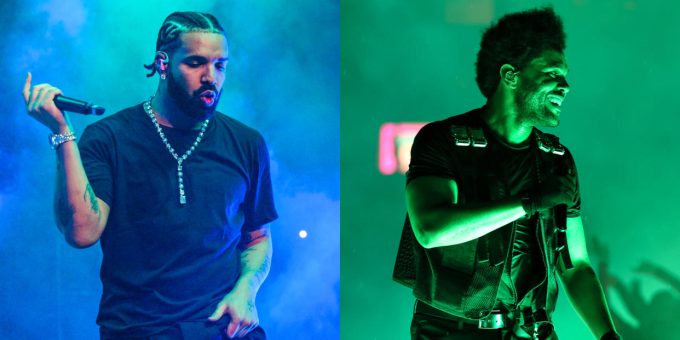
This article was last updated on April 19, 2023
Canada: ![]() Oye! Times readers Get FREE $30 to spend on Amazon, Walmart…
Oye! Times readers Get FREE $30 to spend on Amazon, Walmart…
USA: ![]() Oye! Times readers Get FREE $30 to spend on Amazon, Walmart…
Oye! Times readers Get FREE $30 to spend on Amazon, Walmart…
AI-Generated Rap Song Featuring Drake and The Weeknd’s Voices Sparks Controversy and Removal from Streaming Services
An anonymous musician known as “ghostwriter” recently created an AI-generated rap song called “heart on my sleeve” that featured the voices of renowned artists Drake and The Weeknd. The track quickly went viral, garnering millions of views on social media. However, as of Tuesday morning, the song has been removed from major streaming services, raising questions about the legality and ethical implications of AI-generated music.
The song, which also featured Metro Boomin’s signature producer tag, gained widespread attention due to its accurate replication of Drake and The Weeknd’s voices. Listeners were amazed by the AI models’ abilities, but opinions about the song’s production and existence were divided. Some expressed concern about the implications of distributing AI-generated music on major platforms for profit, while others found the technology impressive.
Ghostwriter, who has a background in writing songs for major labels, used artificial intelligence to create the track. Although they did not disclose which program was used, AI-generated music typically involves writing and recording a song, then using an AI model to replace the artist’s vocals with those of a popular musician.
The song’s removal from Spotify, Apple Music, SoundCloud, Amazon, YouTube, and Tidal was prompted by a copyright claim from Universal Music Group (UMG), which represents both Drake and The Weeknd. UMG had recently called on streaming services to ban AI programs from using its copyrighted music for training purposes.
UMG’s stance reflects a growing concern among artists and their representatives about the unauthorized use of their music and the potential harm it could cause. They believe that platforms have a responsibility to prevent their services from being used in ways that violate artists’ rights. However, legal experts argue that the issue of training AI models using copyrighted songs is still unclear and awaits a definitive court ruling.
Edward Klaris, a media lawyer, suggested that “heart on my sleeve” might infringe on Drake and The Weeknd’s right of publicity – the inherent right of an individual to control the commercial use of their likeness. With regards to the use of copyrighted songs for AI training, Klaris explained that a court decision is needed to determine whether it’s permissible or not.
In the meantime, streaming services have complied with UMG’s request, although they don’t have a legal obligation to block AI-generated songs under Section 230 of the Communications Decency Act, which provides some immunity for internet service providers regarding users’ content.
Despite the takedown of “heart on my sleeve,” ghostwriter seems undaunted, encouraging fans to sign up for updates on the song’s availability on Apple Music and Spotify. The anonymous artist is also using Laylo, a messaging platform for creators and artists, to communicate with their audience and share the AI-generated song.
While the identity and motivations of ghostwriter remain unknown, their actions have ignited a debate about the future of AI-generated music, its impact on the music industry, and the potential consequences for artists’ rights. As technology continues to evolve, the legal and ethical ramifications of AI-generated content will likely remain a contentious issue in the years to come.

Be the first to comment